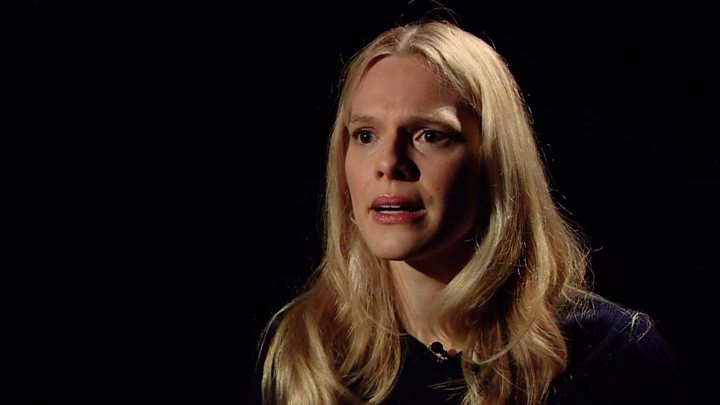Harvey Weinstein's lawyer has insisted she would not engage in an intimate relationship without a signed "consent form". But who would a codified consent form actually protect - and would it stand up in court?
"If I was a man today in today's world, before I was engaging in sexual behaviour with any woman, today, I would ask them to sign a consent form," attorney Donna Rotunno told the New York Times Daily podcast.
When pressed, she added: "Why not? Take all the question out of it. Make it easier on everybody."
The 41-year-old said she had never been sexually assaulted because she had not "put [herself] in that position".
Ms Rotunno's answer did not make explicit reference to Mr Weinstein's accusers, but it mirrors his denials.
His ongoing defence to five rape and sexual assault charges - fronted by Ms Rotunno - hinges on the contention that the producer's actions were consensual, including in one "loving" relationship.
Mr Weinstein is one of more than 40 men accused of sexual misconduct defended by Ms Rotunno. Of these, she has lost just one.
Her words drew swift rebuke from victim's advocacy groups who said the "self-serving" comments amounted to victim blaming.
"The narrative that the ability to avoid rape is under the victim's control is probably good for her business, but has no basis in fact," said a spokeswoman for the Rape, Abuse and National Incest National Network - the largest anti-sexual violence organisation in the US.
But the comments also renewed discussion surrounding efforts to formalise consent in intimate relationships.
The now-defunct LegalFling app, for example, promised to "turn the #MeToos into #iFlings" by asking participants to request and gain explicit consent for specific sexual acts.
"Having an app that clearly shows the rules of engagement as well as personal preferences, can remove misunderstandings and prevent unintentional bad situations," LegalFling said on its website.
Another, We-Consent, asked participants to record a 20-second clip providing video confirmation that they wished to engage in a sexual act.
These two apps - and those like them - have failed to take off, which suggest that codifying sexual consent in any way remains a rarity.
Both suggested they provided a foundation for legal protection. LegalFling promised to enter users into a "live contract", giving participants quick access to cease and desist letters or penalty payments if a breach of contract occurred.

Media playback is unsupported on your device
But such an app, or even a notarised consent contract like that suggested by Ms Rotunno, would have minimal legal bearing.
"In theory, it might be an idea. But in practice, it's just not feasible," says Karen Truszkowski, a Michigan lawyer who exclusively represents children and young adults who have been sexually assaulted.
Any type of legal contract is effectively voided after a party breaches the contract, Ms Truszkowski said. But for all sexual encounters, consent can be withdrawn at any point, rendering such a contract legally useless.
"How would either party enforce that?" she says. "If someone changes their mind, he can't make her have some type of activity."
"There's no protection for either party, it doesn't protect the victim or the alleged perpetrator," Ms Truszkowski adds. "I think it's a misfire."
A consent contract could, perhaps, be used in court to speak to a person's state of mind, or to raise reasonable doubt on an accuser's claims, said Lori Anne Thomas, a Toronto defence attorney.
Electronic records suggesting a consensual relationship either before or after an alleged assault could add weight to a defence of mistaken belief in consent, she said. "But it's really not proof."
"It does not matter if you have ironclad agreements with two lawyers on either side: that person does not have to continue with that behaviour," Ms Thomas said.
And some advocates for victims of sexual violence argue that the emphasis on clearer consent is a distraction from the real problem: the actions of perpetrators.
Listening to Ms Rotunno, "what struck me is how ingrained the trope is of 'this is your fault'", said Sharyn Tejani, director of the TIME'S UP Legal Defense Fund, founded in the wake of the #MeToo movement, which is dedicated to aiding victims of sexual harassment.
The insinuation is that "if you hadn't done X, you would be fine," she continued. "The idea that it's somehow on [the victims of sexual violence] to stop it."
"Lots of people sign contracts when they go into the workplace and terrible things happen to them," Ms Tejani said. "It's the fault of the person who's doing it and the system that allows it to happen."
Ms Truszkowski agrees.
"You're putting the blame on the survivor, or the victim," she says.
"Why do we have to keep teaching girls how to say no when we should be teaching our boys not to assault them?"
https://news.google.com/__i/rss/rd/articles/CBMiMWh0dHBzOi8vd3d3LmJiYy5jb20vbmV3cy93b3JsZC11cy1jYW5hZGEtNTE0NDg0NDXSATVodHRwczovL3d3dy5iYmMuY29tL25ld3MvYW1wL3dvcmxkLXVzLWNhbmFkYS01MTQ0ODQ0NQ?oc=5
2020-02-12 08:57:31Z
52780599713846
Bagikan Berita Ini














0 Response to "Harvey Weinstein trial: Could written sexual consent stand up in court? - BBC News"
Post a Comment